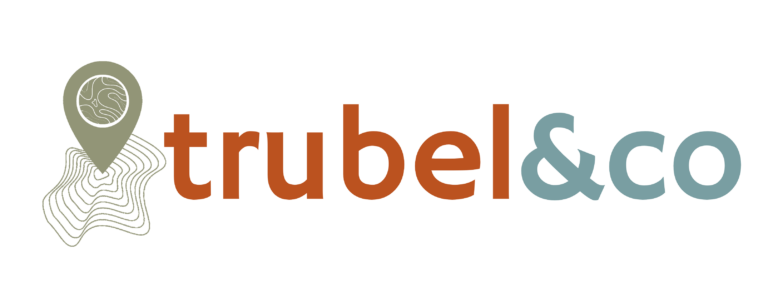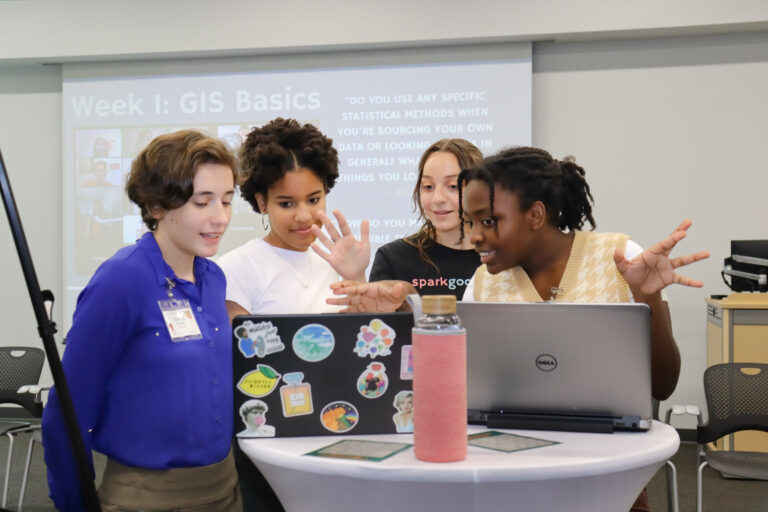2024 Finalist
trubel&co

Blending STEM, civics, and student voice, trubel&co is a tech-justice nonprofit championing diverse youth to tackle social and environmental disparities using data, design, and technology.

trubel&co Students work together at the Mapping Justice Southwest Florida pilot hosted at FGCU.
The Story of 2024 Finalist trubel&co
Bridging the Gap Between Innovation and Liberation
Growing up, Nick Okafor always had a passion for science and technology. But he also felt a strong drive to use those skills to make a real difference in the world. “I grew up in a Nigerian family that was very focused on giving back to the community,” Okafor explains. “As I went into engineering, I knew I wanted to build cool stuff, but I also wanted to do it in a way that helps people.”
This desire to blend his technical expertise with a focus on social impact led Okafor on an unusual academic path. At Washington University in St. Louis, he had to “hodgepodge” a double major in mechanical engineering and international development, since the university kept those disciplines siloed on opposite ends of campus. “I’d have to bike across campus to learn how society works after learning technical skills,” he recalls.
This experience planted the seed for what would become trubel&co, Okafor’s nonprofit organization dedicated to empowering the next generation of “angelic troublemakers”—young people equipped with data science and technology skills, but driven by a passion for equity and justice.
The name itself is a nod to civil rights leaders like John Lewis, who famously called for “good trouble” to disrupt the status quo. “A lot of students who are wanting a better future for our communities may have to stir up some trouble,” says Okafor. “But we want it to be the kind of trouble that’s dedicated toward blending innovation and liberation.”
This ethos is at the heart of trubel&co’s flagship program, Mapping Justice. Piloted through MIT’s high school STEM outreach, the course teaches students to use geographic information systems (GIS) and data visualization as tools for understanding and addressing issues of inequity in their own communities.
“GIS has become a really critical tool that helps students visualize and interpret data in a way that has immediate relevance,” Okafor says. “They can see what’s happening in their own neighborhoods, their own zip codes.”
Beyond teaching technical skills, the program sparks crucial conversations about the root causes of societal problems. “We don’t come in and say, ‘here’s what you should think,’” says Okafor. “We just present the data and facts, and then give students the space to process it and redesign their communities.”
This blending of innovation and advocacy is what sets trubel&co apart. “There’s a large deficit in the field of having technical programming that integrates liberatory design and equity,” Okafor observes. “Students are hungry for opportunities to see themselves in this work—to learn the tools of data science while also grappling with the real issues impacting their communities.”
The demand for trubel&co’s approach has only grown since its programming launched in 2020. What started as a pandemic-era virtual pilot has expanded to in-person summer intensives in Florida and Hawaii, as well as workshops across the country. Okafor’s team has grown to 15 “troublemakers,” all driven by the mission of equipping young people to be agents of change.
As trubel&co looks to the future, Okafor is focused on finding sustainable ways to scale the organization’s impact. “We have the MVP, we have the proof points, now it’s about how we 10x or 100x the reach,” he says. Options on the table include licensing the curriculum, launching a teacher fellowship program, or distilling the programming into more accessible workshops.
Regardless of the path forward, Okafor remains committed to his original vision: creating a new generation of STEM leaders who see their technical skills as a means to a greater end. “We’re hoping to create this world of blended learning, where you don’t have to choose between innovation or liberation,” he says. “You can have a little bit of both.”